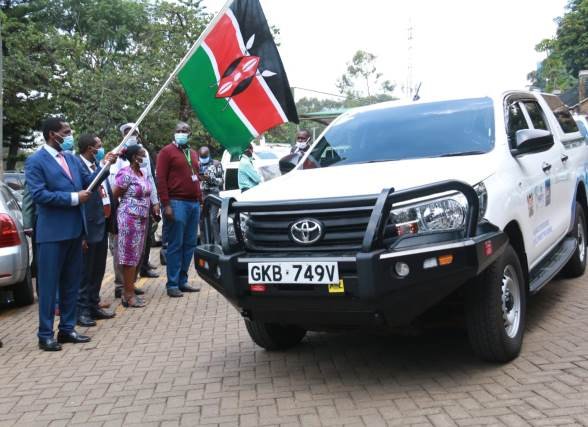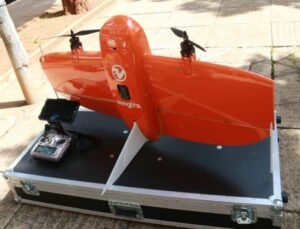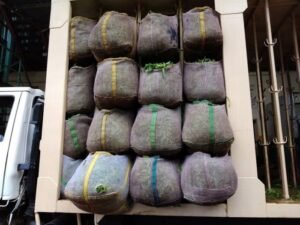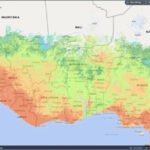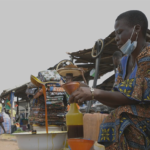By Rootooba Corespondent, 15 May 2020
Kenya aspires to raise the current per Capita fish consumption per year from 4.5 kg per person per year to over 10 kg per person per year by 2030.
In spite of the existing potential, there is a significant gap between the current fish demand of 600,000 metric tonnes and the national fish production of 150,000 MT.
This gap will therefore require the government to revive aquaculture and address the consumption gap as well as market for the Kenyan fish farmers.
Speaking today during the commissioning and handing over of vehicles for the project dubbed Aquaculture Business Development Programme (ABDP) that is designed to support aquaculture farming in 15 Counties with high aquaculture potential, Agriculture Cabinet Secretary Peter Munya said that fish farmers will benefit from soft loans that will be extended under the Ksh 14.9 billion project.
“Small scale fish farmers will benefit from soft loans to be extended under this project that is funded by the Government and International Fund for Agricultural Development (IFAD).
ABDP aims to increase the incomes of farmers, and address food and nutritional security of poor rural households involved in aquaculture ventures, and revolutionize aquaculture from subsistence farming to commercial ventures.
The CS explained that the project presents great opportunities for over 35,500 households accounting for 213,000 beneficiaries who include smallholder aquaculture farmers, input suppliers, aggregators (Independent Aquaculture Aggregators), and processors through Public-Private-Producer-Partnerships (PPPP).
The project is part of the key components of the Agriculture Sector Transformation and Growth Strategy (ASTGS) 2018-2022 designed to achieve 100 per cent food and nutrition security.
Counties to benefit under the project include Nyeri, Meru, Kirinyaga, Embu, Tharaka Nithi, Kiambu, Kajiado and Machakos in the Central and Eastern region and Kakamega, Migori, Homa Bay, Busia, Kisii, Kisumu and Siaya in the Western Region.
Although the project delayed for one year, the CS stated it will be implemented in the next 10 years and ensure small-scale farmers and farmer groups fully adopt fish industry as part of enhancing food and nutrition security.
Munya who commissioned and handed over 16 vehicles for the aquaculture programme at Kilimo house noted that the vehicles will be handed -over to the first six counties under ABDP implementation namely Nyeri, Meru, Kirinyaga, Homa Bay, Kakamega and Migori Counties and the ABDP Programme Coordination Unit.
The remaining 9 Counties under ABDP will receive similar support in the next fiscal year, he said adding that under the project key would be support to County-level extension service provision, support to smallholder aquaculture farmers to acquire inputs and rehabilitation and construction of production units.
“Capacity building for aquaculture value-chain players will complete the link between producers and markets for farmed fish and be able to create structured markets and institutions in the aquaculture value chain”, Munya said
According to the CS the small holder farmers will be organized into small holder aquaculture groups to support counties in making the mini fish processing plants in Meru, Nyeri, Kakamega and Migori.
“ They will develop into aquaculture business hubs, support over 5,500 youths through aquaculture support enterprises (ASEs) through MSMEs related interventions and support over 63,900 women to form viable aquaculture related enterprises”, Munya said
IFAD Country Director Esther Kasulu – Coffin said that the aquaculture sub-sector supports over 60,000 people directly, as fishermen, and over 73,000 fish farmers with close to 70,000 stoked fish ponds.
“The sub-sector supports about 1.2 million people directly and indirectly, working as fishers, traders, processors, suppliers and merchants of fishing accessories and employees”, she said.
Kasulu emphasized that besides being a rich source of protein especially for riparian communities, the sector is also important for the preservation of culture, national heritage, and recreational purposes.
The Country Director has however cautioned against the usage of the vehicles for other purposes other than those under the program.
Principal Secretary Fisheries, Prof. Micheni Ntiba said as a department, they would continue to support the national Eat More Fish Campaigns and urged the Counties to also replicate the same to ensure the government reaches the global average of 20 kgs per person per year by the time the ABDP programme comes to an end.
“The ABDP programme makes the future of Extension Services for fisheries and aquaculture in the targeted Counties have a new beginning after years of lack of support, he said.
Prof. Ntiba called upon the County Programme Coordinators who are implementers of the programme to shun negative interferences and remain focused on the goal by ensuring all the resources allocated to the county are utilized properly for the benefit of fish farmers and stakeholders.
The Government of the Republic of Kenya had realized the key role played by Fisheries and Aquaculture sub-sector and launched a large-scale aquaculture support programme under the Economic Stimulus Programme (ESP) during the period 2009 – 2013 to promote smallholder aquaculture fish production through targeted support for input supply, fish production, post-harvest management and related activities.
The ESP achieved a rapid expansion in the productive infrastructure in the Sub sector, including regions of the country with little history of fish production or consumption.

